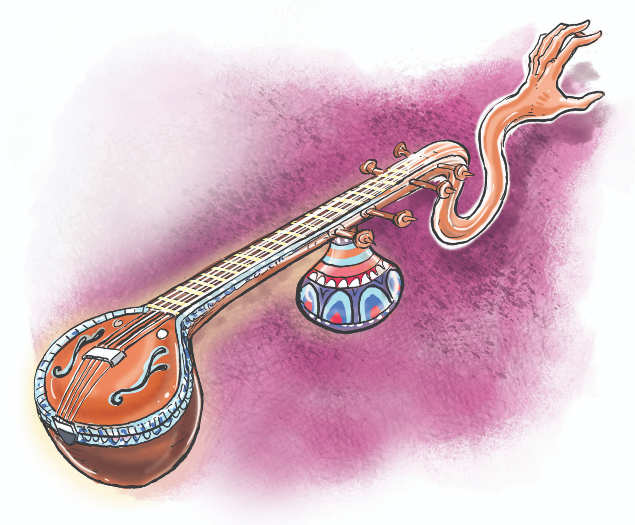One of the worst-kept secrets of the tight-knit Indian classical arts circles is the predatory behaviour a lot of women artistes have to deal with — and it comes not just from all-powerful gurus but also from other men who wield influence, such as the accompanists and organisers. If you are close enough to these circles, you will hear horrific stories of normalised misogyny.
In private conversations, closed-group seminars and WhatsApp groups, women have spoken of their despair at dealing with unwanted attention — the crude overtures of a certain tabla whiz, that khayal vocalist who is best met only in a classroom or the kathak guru who could wreck your academic results if he heard a ‘no’.

The #MeToo movement hit the Carnatic circles in 2018 but it took two years for it to traverse the Vindhyas. Some sporadic efforts to exhort singers and dancers to speak up last year never took off because the artistes wield tremendous power in cultural circuits.
It took the developments at the Dhrupad Sansthan to blow the issue out into the open. Late Wednesday night, a group of 90 Hindustani classical musicians formed a collective to put out a joint statement condemning sexual abuse and the “fear-driven culture of silence in the Hindustani music world” that failed to protect survivors. The group, comprising mostly the younger generation of musicians, a few veterans — and heartwarmingly enough, a large number of men — asked the fraternity to support survivors and overhaul its institutions to create safe spaces for women.
Sarod player Chandrima Majumdar, one of the signatories of the statement, said she’d been lucky to have a great guru but had heard horror stories of abuse of female students by their male teachers. “These are women who opted for a hard life in classical music, giving up other career options and then they are faced with this — either endure or give up. And many of them, wonderfully talented, just quit.”
The sexual bullying in gurukuls as well as formal and informal classrooms is likely driven by the same teacher-student power dynamic as in academia. Only, here it is wrapped in and mystical references to parampara, naad-anhad, atma-paramatma. Indian classical arts traditions place the guru on a near mythical pedestal, beyond question and reproof. In Chaitanya Tamhane’s latest award-winning film The Disciple, the quavering voice of a guru says it all: “Classical music is an eternal quest to reach the Divine. To get there you have to learn to go suffer and surrender.”
Vocalist Shubha Mudgal and tabla player Aneesh Pradhan were among the first to speak up earlier this week, demanding a paradigm shift in traditional systems of learning. “It would be hypocritical on our part to suggest that we are surprised or shocked to learn that sexual misconduct takes place within the hallowed guru-shishya parampara. As students of music and performers we have spent enough time in this milieu to have seen and heard of much worse,” they said in a Facebook statement.
On the more material level, the guru also wields tremendous power over the progression of your art and career, he is the name that opens up avenues or shuts it. It is a world where women are expected to kill their rage and need for justice, says kathak dancer-choreographer Sanjukta Wagh who militates against the idea of a “male divine guru”.
“The Indian classical music and dance cultures have implicit and explicit hierarchies, toxic patriarchies, many levels of exploitation and normalised abuse. The deification and mystification of the guru further fuels this culture and takes pride in silence for the greater cause of art,” said Wagh.
The one big revelation of the #MeToo movement has been that not all kinds of genius comes packaged with decency. And it is a fact that Hindustani vocalist
Neela Bhagwat recognised early in her career.
Bhagwat, who refuses to sing traditional bandishes of chhed-chaad that she believes promote sexual violence and surrender, was likely the first classical woman musician to ever speak up about inappropriate behaviour at the hands of gurus. In feminist scholar
C S Lakshmi’s book The Song and The Singer, published in 2000 by Kali for Women, chronicling the life and creative experiences of women musicians, Bhagwat spoke about her early years as a disciple first with kathak guru Lachhu Maharaj and then vocalist Sharatchandra Arolkar.
She spoke with searing honesty about the demands for intimacy, some gross and others subtle, and her refusal to oblige and its consequences.
“So, the guru was great, the man was not — I saw the difference but many women students found it hard to reconcile the contradiction. Some brought their husbands along so it became difficult for the guru to make those moves,” she said at a seminar held in last February in Mumbai on ‘Gendered Cultures In Classical Indian Dance: Responding to the #Metoo Movement’ hosted by Beej, a dance organisation founded by Wagh.
Is this change here to stay? Given that many of the Carnatic gurus whose names were outed as predators have been reinstated in the cultural circles of the south, that may seem like excessive optimism. Mudgal and Pradhan also point to the painfully slow wheels of justice: “While the victims wait endlessly for justice… prestigious organisations and institutions will have no qualms in associating with those accused of exploitation. All we can hope for is that at least by discussing these issues in public fora, we continue to perhaps deter potential exploiters.”







More News
Anantnag-Rajouri Election To Be Postponed? Omar, Mehbooba Voice Concern On ECIs Query
‘Will this country now work as per Sharia?’: Amit Shah slams Congress manifesto | India News – Times of India
Shillong Teer Result TODAY 26.04.2024 First And Second Round Friday Lottery Result